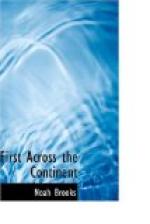“A large part of the meat we gave to the Indians, to whom it was a real luxury, as they scarcely taste flesh once in a month. They immediately prepared a large fire of dried wood, on which was thrown a number of smooth stones from the river. As soon as the fire went down and the stones were heated, they were laid next to each other in a level position, and covered with a quantity of pine branches, on which were placed flitches of the meat, and then boughs and flesh alternately for several courses, leaving a thick layer of pine on the top. On this heap they then poured a small quantity of water, and covered the whole with earth to the depth of four inches. After remaining in this state for about three hours, the meat was taken off, and was really more tender than that which we had boiled or roasted, though the strong flavor of the pine rendered it disagreeable to our palates. This repast gave them much satisfaction; for, though they sometimes kill the black bear, they attack very reluctantly the fierce variegated bear; and never except when they can pursue him on horseback over the plains, and shoot him with arrows.”
Chapter XXII — Camping with the Nez Perces
Soon after they had fixed their camp, the explorers bade farewell to their good friend Tunnachemootoolt and his young men, who returned to their homes farther down the river. Others of the Nez Perce, or Chopunnish, nation visited them, and the strangers were interested in watching the Indians preparing for their hunt. As they were to hunt the deer, they had the head, horns, and hide of that animal so prepared that when it was placed on the head and body of a hunter, it gave a very deceptive idea of a deer; the hunter could move the head of the decoy so that it looked like a deer feeding, and the suspicious animals were lured within range of the Indians’ bow and arrow.
On the sixteenth of May, Hohastillpilp and his young men also left the white men’s camp and returned to their own village. The hunters of the party did not meet with much luck in their quest for game, only one deer and a few pheasants being brought in for several days. The party were fed on roots and herbs, a species of onion being much prized by them. Bad weather confined them to their camp, and a common entry in their journal refers to their having slept all night in a pool of water formed by the falling rain; their tent-cover was a worn-out leathern affair no longer capable of shedding the rain. While it rained in the meadows where they were camped, they could see the snow covering the higher plains above them; on those plains the snow was more than a foot deep, and yet the plants and shrubs seemed to thrive in the midst of the snow. On the mountains the snow was several feet in depth. The journalist says: “So that within twenty miles of our camp we observe the rigors of winter cold, the cool air of spring, and the oppressive heat of midsummer.”




